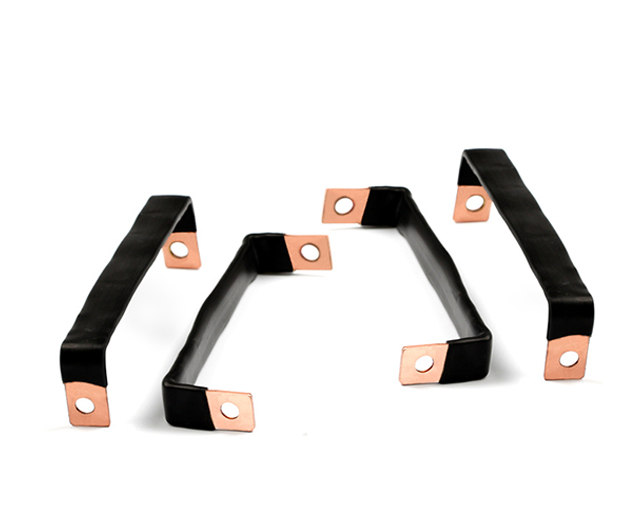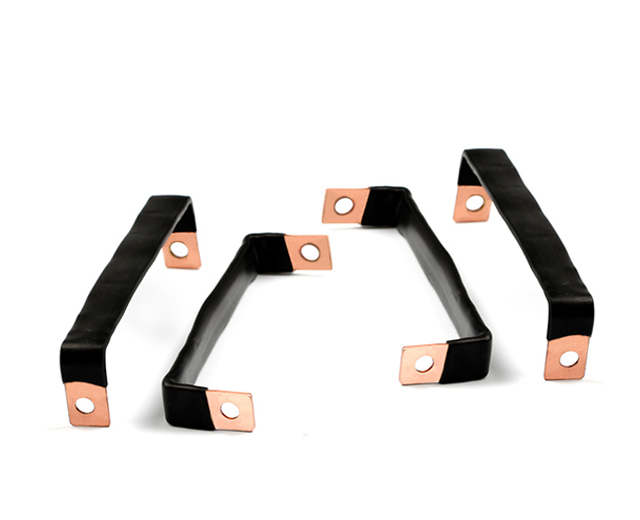

Insulated Aluminum Busbar are high-performance, bendable conductive components made from tinned copper laminated foils or pure copper strips, encapsulated with PVC, PE, or heat-shrink tubing insulation. Designed to carry high current in compact electrical environments, they offer excellent flexibility, conductivity, and safety. Also known as Flexible Insulated Copper Busbars, they are widely used in EV battery packs, switchgears, and power distribution systems due to their flame retardant and high conductivity properties.

The production process of Insulated Flexible Copper Connectors involves:
Copper Lamination: Stacked layers of high-conductivity tinned copper foil or pure copper conductors are laminated.
Press Welding or Riveting: Ends are fused using molecular diffusion welding or press welding for strong conductivity.
Insulation Application: The bar is encapsulated using heat shrink tubing, PVC insulation, or silicone sheaths depending on voltage class and fire-retardant needs.
Customization: Holes, bends, and terminal shapes are CNC-machined according to design specs for custom insulated flexible copper connectors.
This process ensures the final product is RoHS compliant, UL certified, and rated for high current applications with excellent mechanical strength.
The versatility of Insulated Copper Busbars allows them to be applied in many industries:
EV Battery Busbar Systems: For cell-to-cell and module interconnection.
Switchgear Copper Connectors: Used in compact cabinets requiring high current and limited space.
Power Distribution Systems: As low voltage flexible copper bars for energy routing.
Energy Storage Systems (ESS): For secure and heat-resistant energy transfer.
Industrial Electrical Panels: As flame retardant flexible copper connectors for safe power management.
Renewable Energy Installations: Solar and wind inverters using heat shrink insulated copper bars.
G and N Fortune Limited’s Flexible Insulated Copper Busbars offer these key advantages:
High Conductivity: Made from oxygen-free copper foil, ensuring minimal power loss.
Flame Retardant Insulation: With UL94-V0 rated PVC or silicone jackets for maximum safety.
Flexible and Bendable Design: Accommodates installation in tight and irregular spaces.
Thermal Resistance: Operates in extreme temperatures, ideal for EV batteries and industrial setups.
High Current Carrying Capacity: Perfect for power-intensive systems.
Custom Length and Hole Patterns: Supports design flexibility.
RoHS & UL Compliant: Ensures global safety standards.
Designing a high-performance Flexible Copper Laminate Busbar involves:
Current Requirements: Define the amperage to determine the copper cross-sectional area.
Layer Configuration: Decide on foil thickness and number of laminates (e.g., 0.1mm x 10 layers).
Bending Radius: Design with minimum bend radius to preserve flexibility.
Hole/Terminal Placement: Use CNC machining for precise fit into terminals or lugs.
Insulation Selection: Choose between PVC, PE, or heat-shrink tubing based on environmental conditions and flame retardancy.
Voltage Rating: Consider the required dielectric strength to avoid arcing.
G and N Fortune Limited provides Custom Insulated Flexible Copper Bars tailored to your project:
3D CAD Support: Submit your drawing, and our engineers will optimize for manufacturability.
Prototype to Mass Production: From a single prototype to bulk orders.
Labeling & Traceability: Including part number, material, and batch info.
Material Selection: Choose tinned, bare, or nickel-plated copper; insulation options in PVC, PE, or silicone.
As a leading supplier in high-performance electrical copper connectors, G and N Fortune Limited offers:
Over 15 Years of Experience in Flexible Copper Bar Manufacturing
UL & RoHS Certifications for Global Market Compliance
Custom Engineering Solutions for EV, ESS, and Switchgear Applications
State-of-the-Art CNC and Welding Equipment
High Quality Control Standards with 100% Inspection
Fast Prototyping and Reliable Delivery
Competitive Pricing for Bulk Orders
We use high-conductivity tinned copper foil, bare copper, or nickel-plated copper as the conductive core. The insulation layer can be made from PVC, PE, silicone rubber, or heat shrink tubing, depending on temperature, voltage, and flame-retardant requirements.
Flexible copper busbars consist of multiple layers of copper foil, allowing for easy bending and vibration absorption.
Rigid busbars are solid and require more space, offering less installation flexibility.
Insulated types provide safety protection, reduce arcing risk, and are ideal for compact installations.
Yes. G and N Fortune Limited provides fully customized Insulated Flexible Busbar. You can define:
Length and width
Number of copper layers
Terminal hole size and pattern
Insulation type and color
Bend angles and shapes
Just send your drawing or specs — our engineers will take care of the rest.
Current ratings depend on cross-sectional area, copper layer thickness, and insulation. Common configurations support from 100A to 2000A. We will help you calculate the correct size for your application.
Yes. Our insulated copper connectors meet RoHS, REACH, and UL 94-V0 flame-retardant standards. Test reports and compliance certificates can be provided upon request.
Samples or prototypes: 5–7 working days
Bulk orders: 10–15 working days, depending on volume and complexity
Rush orders are available for urgent projects.
They are widely used in:
EV battery packs and modules
Switchgear and control cabinets
Renewable energy inverters
Power distribution systems
Energy storage systems (ESS)
Industrial electrical applications
Avoid sharp bends—respect the minimum bending radius
Ensure all terminal holes align properly
Use appropriate torque settings for fastening
Confirm the insulation layer is not damaged during installation
Installation guides can be provided if needed.